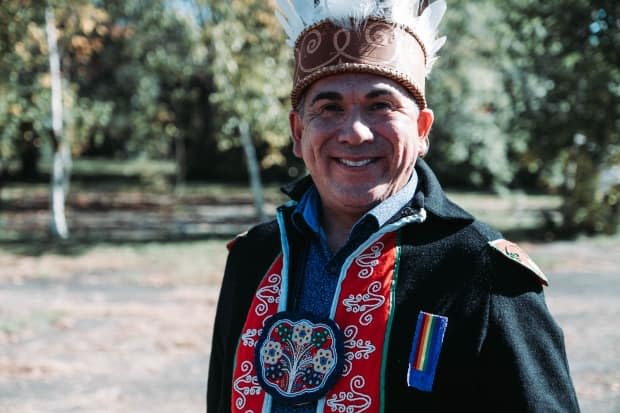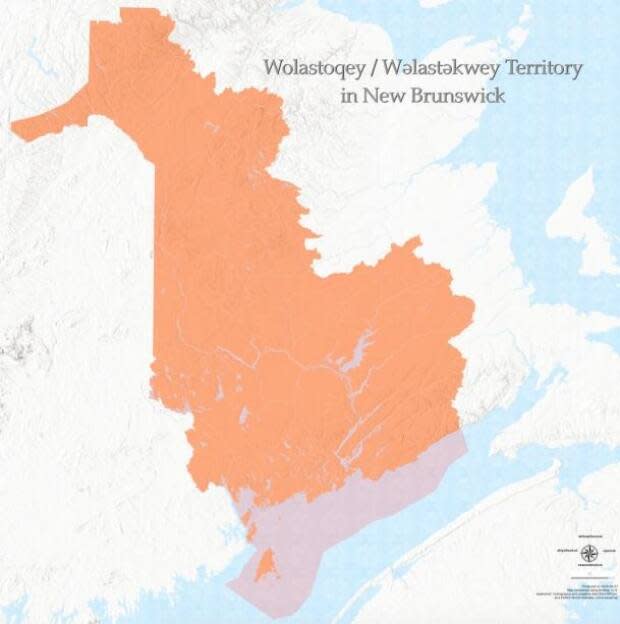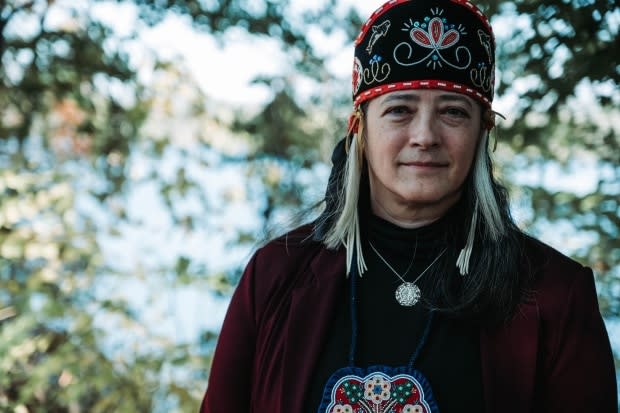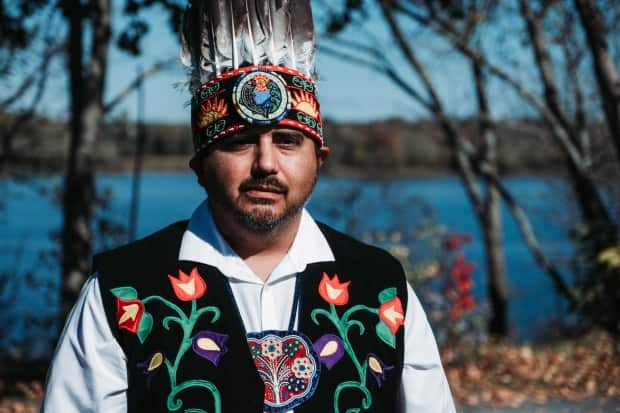Wolastoqey Nation lawsuit to claim title to half of New Brunswick
Six Wolastoqey communities have filed notice of a court action asserting title to their traditional lands along the St. John River, known to them as the Wolastoq.
The title claim covers about half the province.
Community leaders announced the title claim, filed against both the federal and provincial governments, at a news conference on the old burial ground at St. Anne's Point in Fredericton.
They said the Wolasotqey Nation never gave up title to its land in the river watershed when it signed Peace and Friendship Treaties with the British Crown in the 18th century.
From 1725 to 1779, the Crown entered into treaties with five Wabanaki Confederacy nations, including the Wolastoqiyik, at the time known as the Indians of the St. John River.
"We entered into treaties to have peace and friendship with the Crown, but we never agreed to give up our lands," said Chief Allan Polchies Jr. of Sitansisk First Nation in Fredericton.
"We have always honoured our side of the treaties, but the Crown has not."
Broken agreements over the years have left the Wolastoqey communities among the poorest in the province, while others draw wealth from unceded Wolastoqey land, Polchies said. "The treaties made clear that the land would not be taken away from us without lawful process," Chief Patricia Bernard of Madawaska First Nation said. "The treaties were not respected." "The newcomers pushed us from our lands, the lands that had given us life for thousands of years and forced us into six small reserves along the Wolastoq."

Should the six Wolastoqey communities win a declaration of title, Bernard said, they would need to be consulted on matters such as resource extraction projects.
"When things are going to happen with respect to the province, they will have to come consult."
The Wolastoq begins in Maine and runs down through Quebec and New Brunswick into the Bay of Fundy. The Wolastoqey chiefs title claim is only asserting lands within New Brunswick as part of the claim, but they have been in contact with Wolastoqey leaders in Maine and Quebec for potential future claims.
The lands and waters being claimed are those along the Wolastoq as well as its tributaries.

"We now know it was our territory because people went to every corner of it to live our lives, and harvest our foods and our medicines, and do our ceremonies and bury the ones that we've lost," said Chief Ross Perley of Neqotkuk, or Tobique.
"We know the Crown knew it was our land because when they came here to make treaties with us and our people they called us the St. John River Indians."
The lawsuit will ask the court's recognition of the Wolastoqey Nation's title to the land, known as Wolastokuk, but the chiefs said they aren't looking to displace people or get the land back from homeowners or farmers. Nor are they seeking compensation.
"We are not interested in kicking any regular folks out of their houses or off their farms," said Chief Shelley Sabattis of the Welamukotuk First Nation in Oromocto.

"We have no problem with sharing," Perley said. "Sharing the land was foreseen in the treaties, it was the spirit of the treaties, but the treaties said if the settlers wanted the land, there would be a legal process for them to get it."
Bernard said now was the time to file the title claim because the nation has only recently become unified to the level it is now.
"Our community members have been saying this for years, our elders have been telling us about the treaties for years," Bernard said. "We have only recently become united as a Wolastoqey Nation, and that has caused us to organize and move forward."
Bernard said that the chiefs would rather not have to file a title claim but have few options, since negotiations with the provincial and federal governments have had "zero success."
Bernard said the lawsuit was years in the making and the issue could take years to settle.
"This very may likely take us to the Supreme Court if we don't see any willingness from the government to actually sit down and do some acknowledgement."
Bernard said the Wolastoqiyik, or People of the Beautiful River, get their name from the river Wolastoq,which speaks to how connected the nation is to the land.

"There's always going to be challenges but with a win in this title, we have a say," Bernard said. "It makes the government have no choice but to talk to us."
Bernard said that the province's forestry management plan is an example of when First Nations people were not consulted with in New Brunswick and things would be different had they been properly consulted.
"Get in the same canoe as us and paddle down the river," Perley said. "For a better New Brunswick, this needs to be settled.
"Status quo is unacceptable, it's now time to confirm our title to these lands and these waters, for a better future for our people."
Communities of Kingsclear and Woodstock are also part of the title claim.


